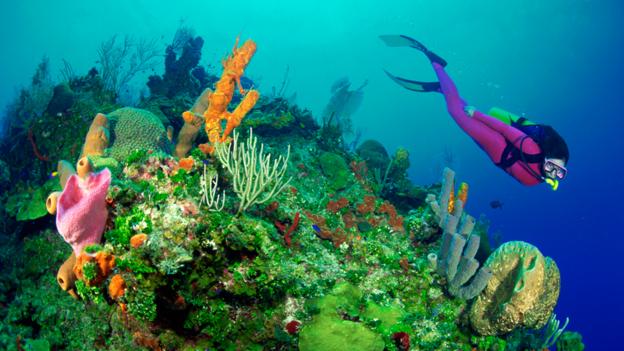The researchers found that when terrestrial conservation was the primary goal that the reefs benefited by 7.7-10.4% greater than other protected areas that weren't focused on terrestrial conservation. However, 31-44% of the terrestrial conservation was not achieved which means that there could be a higher percentage of benefit if terrestrial conservation can be achieved better. These results are being used by the Fiji's protected area committee to better define conservation boundaries on land.

Another method that is being researched is to take more of a gardening approach to the reefs. Studies are being done on how successful coral reefs, grown in labs, that are modified to withstand current oceanic conditions. Artificial reefs such as concrete structures are also being used.
A more abstract study looks into if electrical currents can stimulate coral reef growth. On Vabbinfaru Island, Maldives a 12 meter metal cage that weighed 2 tonnes was placed in the ocean and a small electrical current ran through it. The electric current stimulates a chemical reaction that draws calcium carbonate out of the water and gets deposited on the cage. Studies have also been done that found that the electric current helps them filter and adapt to warmer conditions because less energy is needed to form a skeleton. One of the steel cages used is hard to distinguish now because of all of the colorful reef growth on the cage.
Unfortunately using these steel cages on a global scale would be extremely costly. The only benefit of these artificial reefs would be from tourist areas or areas that are hit by temporary damage such as oil spills or boat impacts. Many of the coral reef researches believe the only way to save the reefs is to greatly slash carbon dioxide levels across the globe, but they don't see that being accomplished. Researcher Peter Sale said "By 2050, we may still have corals, and things we'll actually call 'reefs', but they will be massive limestone structures that were built in the past, with tiny patches of living coral struggling to survive on them." He adds "The world will go on without reefs, but its going to be very much inferior to the planet we have now."
References:
http://www.sciencedaily.com/releases/2013/12/131217155329.htm
http://www.sciencedirect.com/science/article/pii/S0308597X13002261#
http://www.bbc.com/future/story/20120905-save-our-dying-coral-reefs

The electrical current study sounds really interesting.
ReplyDeleteWhat is in the land based runoff? Sediment, fertilizers, wastewater, etc? Did it say?
I think the gardening approach sounds interesting, but I wonder if introducing modified corals into the ocean is feasible on a large scale to make up for the destruction that has already been done to the reefs...
ReplyDeleteI didn't know that an electrical current could draw calcium carbonate out of the water. I wonder if the current would allow enough calcium carbonate to be extracted to make up for the amount that's lost via ocean acidification.
I saw in interesting article on my Facebook newsfeed today, a possible incentive for the protection of coral reefs? Coral reefs provide potent new anti-HIV proteins: http://www.sciencedaily.com/releases/2014/04/140429092649.htm
Who knows what else the reefs have to offer...
This comment has been removed by the author.
ReplyDelete